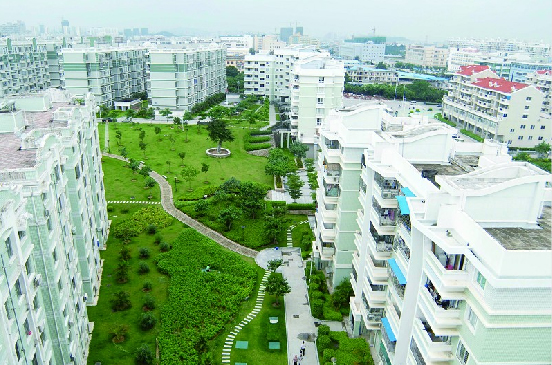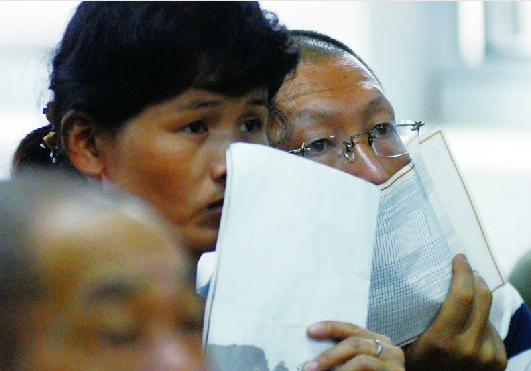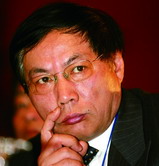Can China guarantee housing to all of its citizens? In attempting to do so, cities are tinkering with a multitude of government-subsidized housing options and pilot programs. The issue took on a new urgency when officials at the latest meeting of the National People's Congress passed a government institution reform package that established a new "super ministry" tasked with, among other thigns, hammering out feasible and sustainable guaranteed housing systems across China. For background on this series and the "five haves", see below.
Case Study: Xiamen Tests the Water
Picutred: One of Xiamen's government-backed guaranteed housing projects Since the national housing reform began in 1998, Xiamen was the first city to invest huge sums of money into building market-priced housing which would be integrated into a housing guarantee system. The system, originally planned to cover 40% of the city's population, was expanded in the first quarter of 2008 to cover 50%, including migrant workers and recent college graduates.
Since the national housing reform began in 1998, Xiamen was the first city to invest huge sums of money into building market-priced housing which would be integrated into a housing guarantee system. The system, originally planned to cover 40% of the city's population, was expanded in the first quarter of 2008 to cover 50%, including migrant workers and recent college graduates.
Xiamen's 20 "guaranteed housing" projects – involving 45,000 housing units - will take until 2010 to be built. The 13 billion yuan needed to fund the construction will be invested in installments of two or three billion each year by the Xiamen local government.
Deputy director of Xiamen's Ministry of Finance, Wu Qiming, told the EO that Xiamen government revenues for 2007 amounted to 34.8 billion yuan, and 18.7 billion yuan coming from local municipalities. These are 30% and 37% higher than the previous year's revenues, and enough to cover the costs of the guaranteed housing project.
Despite enthusiasm by Xiamen residents and guarantees by officials it can foot the bill, questions remained: How would expenditures for such housing projects be balanced against the financial needs of Xiamen's other public policy endeavors - in education, health care, etc? And in 2008, with the central government expected to tighten the money markets, wouldn't it be more difficult for the Xiamen government to find loans?
Furthermore, beyond the costs of building the units, the government would suffer an opportunity cost of allocating the land underneath those new residential units for free. If Xiamen government instead sold the land, it would make between seven and eight billion yuan.
The Birth Of Xiamen's Guaranteed Housing
Pictured: Xiamen residents wait for their housing lottery assignments In 2005, a survey revealed that skyrocketing real estate prices were making life extremely difficult for low-income Xiamen residents. In 2006, the real estate market was unusually hot, with units selling the moment they were put out. Officials conducted one survey that found 9 out of 10 buyers were making investments.
In 2005, a survey revealed that skyrocketing real estate prices were making life extremely difficult for low-income Xiamen residents. In 2006, the real estate market was unusually hot, with units selling the moment they were put out. Officials conducted one survey that found 9 out of 10 buyers were making investments.
In March of 2006, a document aiming to carry out national real estate market controls at the local level made it to the Xiamen municipal Party committee. Before this, the idea of "guaranteed housing" had yet to truly surface in other cities. Heeding warnings in the report of the need to establish a guaranteed housing system in Xiamen sooner rather than later, Li Chengfeng, the Xiamen party secretary, threw his weight behind the idea.
In May, at another Xiamen Party committee meeting, it was decided that the traditional low-income housing system was insufficient, with space limited and prices unreasonable. It was decided that a new system should be researched.
Later on in 2006, Wanliao, a property developer, bought building space in Xiamen at 4,000 yuan per square meter and sold it for 12,000 yuan, a spread that shook the market and set a new standard. Then, not 30 meters away, Xiamen government built similar units to be sold at 4,200 yuan per square meter.
In 2007, the Ministry of Construction invited officials from developing cities to Xiamen to encourage them to learn more about Xiamen's breed of guaranteed housing. But because Xiamen is one of the more wealthy cities, officials from elsewhere expressed skepticism that they would be able to duplicate its success. Costs aside, one Beijing official noted that due to Beijing's housing management system, the Xiamen way would be impossible to implement.
Ren Zhiqiang: Safety Net, Not Springboard "Guaranteed housing is a new idea to everyone," said Ren Zhiqiang, CEO of Huayuan Group, who has a different opinion about what has been called "the year of the great return to guaranteed housing."
"Guaranteed housing is a new idea to everyone," said Ren Zhiqiang, CEO of Huayuan Group, who has a different opinion about what has been called "the year of the great return to guaranteed housing."
"Does China have guaranteed housing before?" he asked. "Before 1998, housing was basically supplied by the planned economy, which was a wealth distribution and welfare system. But it was not a guarantee like the one in market economy."
Not long before Ren said this, on Christmas Day 2007, the Ministry of Construction's Guaranteed Housing division quietly came into being with nothing more than a press release and a brief explanation of the new entity which was posted on the Ministry's website.
At that time, debate was still thick with questions of whether or not to strengthen market reforms or increase the coverage and quality of guaranteed housing, We asked Ren how, in a market economy, a government can guarantee housing. (Full disclosure: Ren is perceived widely as an opponent of guaranteed housing)
The EO: The housing problem has already become a very public one. Is this because a shortage has reached a critical point?
Ren: This is what some people think; they believe that the government previously took no role in constructing housing.
What is public housing? Before 1998, everyone, regardless of whether they were poor or wealthy, all had to wait for their housing allotment, and thus couldn't really talk about housing guarantees. The concept of government guarantees was brought up after the 14th Party Congress examined the idea of a market economy.
Today, housing that was once a part of the housing allotment system makes up 50% of China's total housing. Rentable, state-owned housing makes up 10%, and commercial housing only makes up 20%. There's no lack of housing—look for yourself, who's sleeping on the streets?
The problem is that now, because commercial property has proliferated and raised the standards of living, families are demanding an improvement to their housing situations. But between 1998 and 2007, just eight or nine years, there was a vacuum for housing guarantees. This is the main reason why people have been calling for guaranteed housing.
The EO: The middle class has recently been included in guaranteed housing. Does this mean that coverage has expanded?
Ren: The keyword here is "help". The guaranteed housing system will "help" the middle class, but not include them in the category of those who are guaranteed housing.
The EO: Then can fixed-price housing be seen as a start to helping the middle class?
Ren: I don't look highly upon fixed prices.
If you're talking about "economic rentable housing", I think that as long as there's a rational system, it's acceptable, because the power to rent property is just that, and it's easier to be transparent, fair, and the grey areas are reduced. But to fix prices is exactly the same as redistributing property,and it's tough to ensure the redistribution process is transparent and fair, thus that could lead to more injustice.
The EO: For guaranteed housing, what would be an acceptable framework?
Ren: For the housing problem, there are two ranking problems that need to be solved. The first is residential rights, and the second is the right to migrate.
The right to housing falls under "human rights". It's a basic right to survival. Society has to protect this bottom line. But how low the bottom line should go is where the debate is.
The EO: What do you think the bottom line is?
Ren: I recently read Thomas Malthus' Essay on the Principle of Population. Although at the time of writing this work was largely rebuked, it's worth rethinking.
Malthus said that precisely because of the poverty relief laws in England of his day, those groups who enjoyed guarantees became even lazier. Although those laws, of course, aimed to reduce poverty, they did not succeed in doing so.
Malthus didn't simply oppose population increases, but was instead discussing the possibility of saving society.
To this end I think that housing guarantees should be safety net – for example, the bottom 10% should be protected. Guarantees should help realize the right to housing, not to provide a degree of comfort or a "spring bed". We don't have enough resources for that.
The EO: As for the second right, the right to migrate, what does this have to do with improving the housing system?
Ren: The right to migrate, it's too real.
Before 1958 there was no hukou system. In 1959 there was an agricultural and urban hukou system, which then shut down the free movement of people.
If you're in a Chinese city, you don't have a hukou (residence registration), your kids are in school, but you can't apply for welfare services. If Chinese could move freely, you would go wherever you thought would be best for you. In this way society would adjust itself, adapt, in its own course. The fairness of local government and its transparency would increase dramatically, and the costs in managing the society would decrease.
But it's not like that now. Some cities can't retain their wealthy residents, and others are receiving a steady stream of them. This will lead to those in the lower classes to feel like their resources are being robbed.
Update: Guaranteed Housing at the NPC and CPPCC
Last week, the National People's Congress passed a reform package that would establish a new "Super ministry" dubbed the Ministry of Housing and Urban Construction, which will be tasked with the issue of guaranteeing housing.
Chinese Premier Wen Jiabao, on March 5, said that the government would focus on the establishment of a housing guarantee system for middle and low income families while simultaneously putting a halt to overheating real estate prices. It was also announced that the central government would invest a total of 6.8 billion yuan to build up the low-rent housing system, up 1.7 billion yuan over last year's commitment.(Source: China News Net)
Congressional representatives called specifically for low-rent housing to take on the major role in providing guaranteed housing to Chinese. (Source: Xinhua)
Qi Ji, vice-minister of the newly founded Housing and Urban Construction Ministry, said that housing prices had risen slower since the fourth quarter of last year, and had already been positively affected by government's policy. However, he admitted that China, in its current phase of development, was unlikely to see the tight supply and demand loosen in the short term. (Source: Xinhua)
Background
The Chinese government's oft-stated goal of constructing a "harmonious society" has increasingly focused on five core issues, or "five haves", closely tied to the livlihoods of Chinese--that is, universal access to education, employment, housing, social security and health care. In the 17th Congress of the Chinese Communist Party, these new focus areas were enshrined by President Hu Jintao's Party report, and are expected to be widely discussed and pursued during the top legislative sessions thereafter.
The two sessions (lianghui or 两会 in Chinese) refer to meetings of the Eleventh National People's Congress (NPC) and the Chinese People's Political Consultative Conference (CPPCC) from March 3 to 18.
In view of this, the EO published a five-part special focusing on each of the "five haves", including case studies and interviews.
Reported by Jiang Hongqiao, Lu Shangchun
Translated by Rui Bingyou
- 海外敌意并购案首例中钢全现金收购Midwest | 2008-03-19
- The Venom of Boorish Speech | 2008-03-18
- 优酷网联手MySpace 发力视频营销 | 2008-03-18
- 保险资金投资A股4个10%一并打开 政策“开道” | 2008-03-18
- Super Ministries' Success Hinges on Checks and Balances | 2008-03-17











